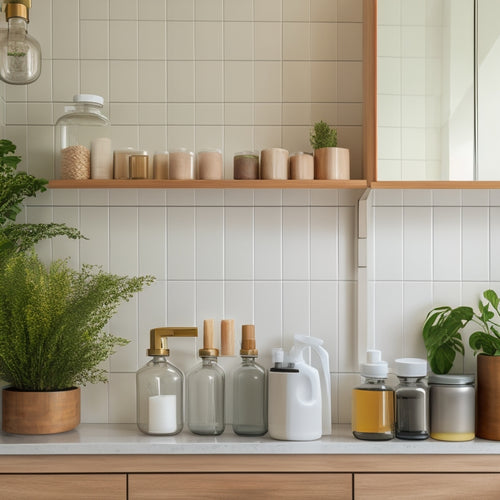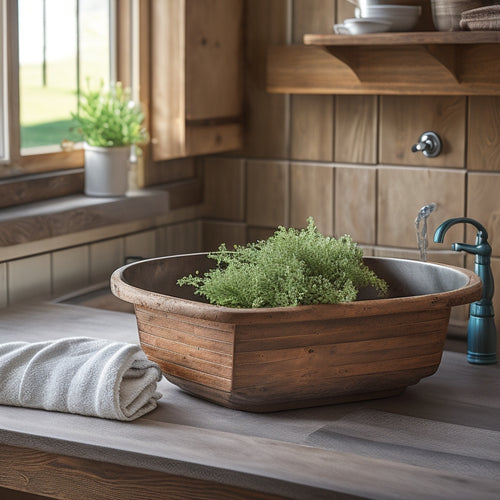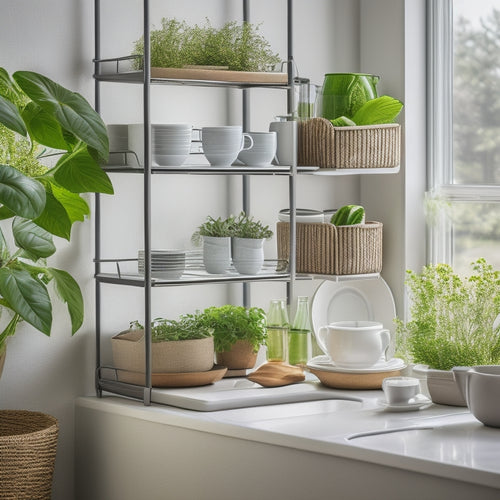
House Design Emphasizes Kitchen's Vital Role
Share
A well-designed kitchen is the core of modern homes, serving as a multifaceted hub that fosters social interaction, creativity, and connection while also driving the functionality and value potential of the entire living space. Effective design elements, such as balanced lighting solutions and thoughtful color schemes, combine to create a warm and inviting atmosphere. By blending aesthetics with practicality, a kitchen can seamlessly integrate form and function, ultimately enhancing a sense of community and facilitating lasting memories. As we explore the intricacies of kitchen design, the significance of this crucial space comes sharply into focus.
Key Takeaways
• A well-designed kitchen serves as a central hub for family gatherings, fostering social interaction, creativity, and connection.
• Effective kitchen design combines aesthetics with practicality, incorporating essential elements like lighting, color schemes, and ergonomic principles.
• A visually appealing kitchen balances color, texture, and pattern to create a functional and enjoyable space that promotes a sense of community.
• Optimizing storage and workflow is crucial, as it enhances visual appeal, functionality, and safety, while reducing clutter and promoting efficiency.
• High-quality finishes, premium materials, and cutting-edge appliances can significantly enhance a kitchen's value potential and resale value.
Kitchen's Central Role in Homes
In modern homes, the kitchen has evolved into a central hub where family members gather, share meals, and create lasting memories, making it an essential component of household dynamics.
As the heart of the home, the kitchen plays a significant role in fostering family gatherings and culinary inspiration. It's where loved ones come together to share stories, create traditions, and make memories that last a lifetime.
A well-designed kitchen not only provides a functional space for food preparation but also serves as a catalyst for social interaction, creativity, and connection. By prioritizing the kitchen's central role, homeowners can create a warm, inviting atmosphere that brings people together and inspires a sense of community.
Design Elements for Optimal Function
Optimizing kitchen functionality revolves around strategically incorporating essential design elements that harmoniously blend aesthetics with practicality. Effective lighting solutions are critical, as they can greatly impact task efficiency and ambiance.
A well-designed lighting plan should consider both natural and artificial light sources, ensuring adequate illumination for food preparation, cooking, and socializing. In addition, thoughtful color schemes can influence the kitchen's overall atmosphere and functionality. By selecting a palette that complements the kitchen's style and materials, designers can create a cohesive and inviting space.
Incorporating ergonomic principles and intuitive layouts can streamline workflows, reducing the risk of accidents and promoting a safe cooking environment. By carefully balancing these design elements, homeowners can create a functional and enjoyable kitchen space.
Creating a Visually Appealing Space
Three key visual elements—color, texture, and pattern—must be thoughtfully combined to create a kitchen space that is both aesthetically pleasing and functional. A harmonious color scheme can be achieved by selecting a dominant color and balancing it with complementary hues. Texture adds depth and visual interest, while pattern can create a sense of rhythm.
| Visual Element | Design Considerations | Safety Implications |
|---|---|---|
| Color Schemes | Balance warm and cool tones | Avoid overpowering or stimulating colors |
| Lighting Options | Task, ambient, and accent lighting | Guarantee adequate illumination for safe food preparation |
| Texture and Pattern | Mix matte and glossy finishes | Prevent slippery or rough surfaces that may cause accidents |
Storage and Workflow Considerations
Efficient storage and workflow considerations are vital in a kitchen design, as they directly impact the functionality and usability of the space, while also influencing the overall aesthetic appeal.
A well-organized kitchen layout guarantees that all essential items are within easy reach, reducing clutter and promoting a safe cooking environment. Organization solutions, such as adjustable shelving and pull-out cabinets, can be implemented to maximize storage capacity.
Efficiency tips, like placing frequently used items near the cooking zone, can also streamline workflow. By optimizing storage and workflow, homeowners can create a kitchen that is both visually appealing and highly functional, making meal preparation a breeze.
Maximizing Kitchen's Value Potential
Incorporating high-quality finishes, premium materials, and cutting-edge appliances can significantly enhance a kitchen's value potential, thereby increasing the overall resale value of the property. A well-designed kitchen not only improves the aesthetic appeal but also enhances kitchen efficiency. Modern kitchen trends focus on creating a seamless workflow, ample storage, and innovative features that cater to the needs of homeowners.
| Design Element | Description | Benefits |
|---|---|---|
| High-gloss cabinets | Premium materials, sleek design | Improved visual appeal, durability |
| Smart appliances | Advanced technology, energy efficiency | Enhanced kitchen efficiency, reduced energy costs |
| Quartz countertops | Sturdy, low-maintenance | Easy cleaning, resistance to scratches and stains |
| LED lighting | Energy-efficient, adjustable brightness | Enhanced ambiance, reduced energy consumption |
| Island with storage | Spacious counter space, organized storage | Improved workflow, reduced clutter |
Frequently Asked Questions
How Do I Choose the Right Kitchen Layout for My Lifestyle?
When selecting a kitchen layout, consider your cooking habits and prioritize kitchen organization, ensuring adequate storage and workflow. Optimize cooking ergonomics by positioning frequently used items within easy reach, promoting a safe and efficient cooking environment.
What Are the Benefits of Using Eco-Friendly Kitchen Materials?
When selecting kitchen materials, opting for sustainable options promotes healthier living by reducing exposure to toxic chemicals and minimizing environmental impact, while also creating a safer, visually appealing space that supports well-being and eco-friendliness.
Can I Incorporate Smart Home Technology Into My Kitchen Design?
"Imagine a kitchen where technology harmonizes with culinary creativity. Yes, you can seamlessly integrate smart home technology into your kitchen design, incorporating smart appliances and space-saving solutions that prioritize convenience, efficiency, and safety."
How Do I Balance Kitchen Functionality With Aesthetic Appeal?
To balance kitchen functionality with aesthetic appeal, consider harmonious color schemes, strategic lighting, and clever storage solutions that conceal clutter, while thoughtfully selecting decor that enhances visual flow and guarantees a safe, efficient workspace.
Are There Any Kitchen Design Trends That Are Here to Stay?
According to the National Kitchen and Bath Association, 70% of homeowners consider the kitchen an important aspect of their home's value. Timeless classics, such as Shaker-style cabinets, and minimalist chic elements, like Quartz countertops, remain popular kitchen design trends that are here to stay.
Related Posts
-

Under-Sink Storage Tips for Minimalist Kitchens
To maximize under-sink storage in your minimalist kitchen, start by utilizing vertical space with shelf risers and st...
-

Sink Caddy Organizers for Farmhouse Style Kitchens
Sink caddy organizers are perfect for elevating your farmhouse-style kitchen while keeping it functional. You'll love...
-

Tiered Dish Rack Organizers for Compact Spaces
Tiered dish rack organizers are perfect for compact spaces, maximizing vertical storage while saving precious counter...


